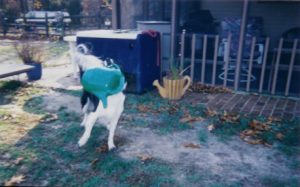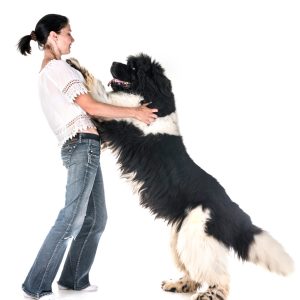
 Renee Premaza
Renee Premaza
Certified Dog Behavior Consultant
Phone: 609-280-9338
Email: jerseydogtrainer@gmail.com
In Home Training & Behavior Modification
_____________________________________________________________________
In-Home Training Hours = Mondays thru Sundays (daytime only):
First choice appointment = 10:00 a.m. – 11:30
Second choice appointment = 1.00 p.m. – 2:30
All visits = 1 – 1/2 hours
In-Home Fees: $300.00 per visit, but a package of 4 visits can save you 150.00, but you would need to give me a check or cash for $975.00 before I leave your home on the first visit.
____________________________________________________________________
I frequently travel to Williamstown, Sicklerville, Marlton, Medford, Mt. Laurel, Moorestown, Hammonton, Cherry Hill, Haddonfield, Voorhees, Sewell, Collingswood, Westmont, Mullica Hill, just to mention a few. The farthest I travel is 45 minutes from Williamstown.
____________________________________________________________________
How Do You Know When Your Dog Needs Training?
All puppies and dogs need at least basic training in manners and self-control. An untrained dog is like an untrained child. As with our children, dogs must learn that there are rules to follow in their lives in order to live successfully with us in a domestic environment. Your dog needs to learn that you are his or her trusted guide and teacher, you control all the good and necessary resources in his life, and you make all of the critical decisions that affect his safety and well-being.
If your dog won’t listen to you, train him to pay attention! If your dog won’t come when called, train him to come to you! If your dog pulls you when you walk, train him to walk on a loose leash! He will not figure out how to perform good behaviors unless and until you teach him!
If you train your dog at a very early age (you can begin training puppies at 8-9 weeks), your dog will be much less inclined to develop major behavior problems throughout its life. If you neglect early training, you may experience some of the following problems with any breed at any age:
- Jumping on guests and children
- Digging holes in your yard
- Stealing things just to get your attention
- Excessive barking both in the home and outside
- Pushy and demanding behaviors
- Nipping and mouthiness

- Rude behavior with other dogs
- Anxious and fear-related behaviors
- Dog can become out of control
- Food and object possessiveness
- Pulling on leash
- Will not come when called
- Inattentiveness to you
- Dog to dog aggressiveness
- Dog to human aggressiveness
_________________________________________
A WORD ABOUT PUPPIES:
To prevent having behavioral problems develop in the first place, avoid getting your puppy during the winter months. You will have a difficult time house-training your pup to go outside due to bad-weather days and nights. You will also have a much more difficult time getting the puppy out for walks and socialization, both of which are hugely important for all puppies! Avoid giving a new puppy as a gift unless that recipient is with you to select the puppy. Make sure you research the breed that you are thinking about getting, as well as the breeder! Your puppy’s breed will determine some of his future behaviors. If you’re shopping for a puppy, be sure to meet and interact with the puppy’s mom and dad. Afterall, they are the basis that forms your puppy’s genetic makeup. Even if you see a puppy that you fall madly in love with, think {Red Flag !} IF: the breeder won’t allow you to meet the mother, you see any unfriendliness from either of the parents, or you notice that the puppy you are most attracted to… is not so attracted to you!
Avoid bringing your puppy home before s/he is 8 weeks old! Dogs need to be with their moms and littermates in order to learn important things, like dog to dog social skills and bite inhibition! Puppies who are taken from their litter before 8 weeks will play-bite using a lot harder pressure than puppies brought home at 8 weeks. They may also be lacking in dog-dog social skills! If a breeder seems too anxious to release the puppies before then, that is another {Red Flag !} that the breeder just wants to get rid of the pups and get paid.
Make sure you’re going to be able to get your puppy out for frequent potty breaks. Crating puppies for long periods of time is very counterproductive and can actually cause significant behavior and emotional problems to develop, even later on. Make sure you have the time to exercise your new puppy, get the kids off to school, go to work, and still be able to meet your puppy’s basic needs. Puppies are a lot of work! You will need to devote time for your new puppy if you want to avoid house-training accidents, chewing and other destructive behaviors. One more bit of absolutely free advice: make sure to teach your puppy how to be alone! From day 2, begin leaving puppy in the crate alone for 10 minutes, then 20 minutes while slowly building up to longer periods of time each day. Rule of thumb for leaving dogs alone in the crate go something like this: At 2 months, leave pup alone for no longer than 1 hour (after doing some “alone” training); at 3 months, leave pup alone for 2 hours, at 4 months, leave pup alone for 3 hours, and so that’s how it goes. I can’t tell you how many dogs develop severe separation anxiety because owners neglect to teach the dog to be alone when they’re very young puppies. Unfortunately, Covid 19 has created havoc with dogs due to lack of socialization and not being taught to be alone!
When you get your new puppy or you adopt a new adult dog, do not make the mistake of spoiling him. All too often, we rescue dogs that have had unfortunate past lives and we feel that we have to make it up to them by giving him constant love and everything they want. Spoiling a dog will not show him you love him and it will not make up for all that went wrong in his life before he came to you! By spoiling him, you will only be telling him that you’re weak and can’t implement rules. Dogs absolutely need to know there are rules to follow. If you give your puppies or dogs everything they want, they will become obnoxious and demanding! Avoid allowing your dogs to get up on furniture or to sleep in your bed or your children’s beds until you have done some training and know your dog does not have any major behavior issues. Avoid giving your puppies and dogs treats just because they’re cute and breathing! Also, avoid mindlessly petting your dogs. Use treats and petting as a reward because they’ve offered appropriate behaviors that you like.
___________________________________________________________________
If you are looking for GROUP CLASSES, please contact Wonderdogs Training Facility, located at 432A Kelley Drive, West Berlin, NJ — (856-767-6464).
Treat Your Dog Like a Human and He’ll Treat You Like a Dog!
Good luck and enjoy your dogs!
